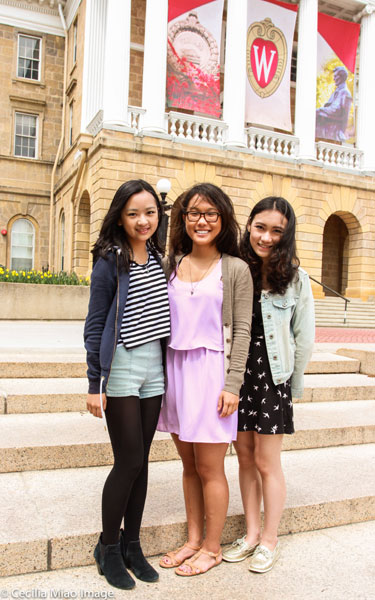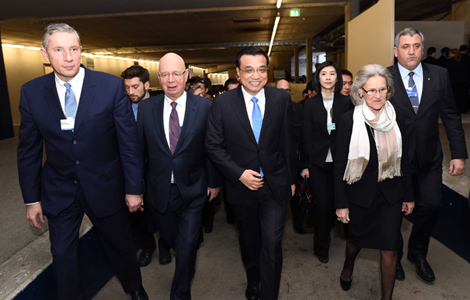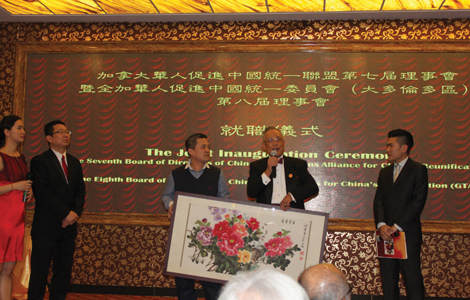Channel bridges student cultural divide
Updated: 2015-01-22 15:17
By NIU YUE in New York(China Daily USA)
|
||||||||
 |
|
NiuMuge (left), Pan Fangdi (center) and Miao Si (right), all of whom studied at the University of Wisconsin – Madison are the founders of Channel C. Provided to China Daily |
How would it feel for two people to live under the same roof but move in different worlds?
My "Foreign" Roommate, a short film on Channel C on You Tube to be released Friday, demonstrates that having a Chinese student as a roommate can quickly answer that question.
The 11-minute film focuses on how American and Chinese students bridge their cultural gaps. Chinese students stir-fry often, and the smoke even causes fire alarms to ring. They are not familiar with clothes dryers and hang underwear on the balcony. They may even have names that Americans cannot pronounce, as some Chinese sounds do not exist in English.
The group, increasing at some 300,000 per year according to the Institute of International Education, tends to be reclusive on US campuses. From the moment they arrive in the United States, they can be picked up by Chinese students associations at the airport and hang out with Chinese students, seldom interacting with local students.
"[Seeing this], American students do not bother to break down the barrier to communicate with them," said Niu Muge, the film's leading actress and a producer with Channel C.
Niu was once studying journalism and economics at the University of Wisconsin in Madison and is now pursuing a master's degree in journalism at Columbia University in New York.
Wisconsin once staged an event to bring students from both countries together in 2013, but only three Chinese students, Niu, Miao Si and Pan Fangdi attended.
The three girls, who didn't become friends until that day, felt they should do something, and they created Channel C in April 2013 to bridge the communication gap. Another student at Wisconsin, Du Ye, joined the group in September 2013.
The team learned from Buzzfeed and produced short talk shows and interviews with funny music. It started with why Chinese students traveled to the United States, and then began to answer questions many American students had wanted to ask but hadn't for fear of offense, such as why Chinese students don't love to speak English or don't love to party.
It also included topics on what American students actually thought about Chinese, such as how Chinese and American boys rate Chinese girls differently.
All content is produced in English with Chinese subtitles. More than 8,000 have subscribed to their YouTube channel, and the most popular episode, Why don't Chinese students speak English? has drawn more than 240,000 views.
"Channel C led me to constantly think about myself and the future of Chinese students around the world," said Miao, the project's leader. "It's a journey."
"They took to the social media to create a platform that has grown into a phenomenon," said Nicole Huang, director of the Wisconsin China Initiative at the university. "I really hope that more young people will follow their footsteps, take the matters into their own hands, and come up with more creative solutions."
The girls who founded the team are now scattered in different parts of the world. Niu is in New York; Miao is seeking a job in Beijing; Pan is studying international relations in California; and Du is working in Chicago.
The Channel C team went to Chicago and worked with Wang Tianwei, a film major from Columbia College in Chicago. It took several months for them to arrange all the shootings in a three-day schedule. It took another two months to edit them all.
It is "a carefully crafted material under restraining circumstances, including but not limited to having a low budget, short production window, as well as a general lack of resources," said Wang.
The movie ends as the two students, who live in different worlds, finally become friendly and start to appreciate each other's world.
"At first I was only concerned about voicing for ourselves and clearing up stigmas in the US," said Miao. "Then I'm also concerned about how we can inspire more people to be welcoming and receptive of new faces and ideas, be it domestic or foreign, in China or America."
Lu Huiquan in New York contributed to this story.

 Li predicts bright future for real estate
Li predicts bright future for real estate
 Wanda boosts its branding in Europe
Wanda boosts its branding in Europe
 Ontario highlighted in overseas investment forum
Ontario highlighted in overseas investment forum
 Texas executes man convicted of killing 3
Texas executes man convicted of killing 3
 US, Cuba end migration talks
US, Cuba end migration talks
 HK trade office refresh ties in Toronto
HK trade office refresh ties in Toronto
 US Justice Department ready to clear Ferguson
US Justice Department ready to clear Ferguson
 Across Canada Jan 21
Across Canada Jan 21
Most Viewed
Editor's Picks

|

|

|

|

|

|
Today's Top News
Bank takes renminbi-clearing seriously
Traditional Garb
HK trade office refresh ties in Toronto
Chinese developer buys Canadian ghost town
Beijing gears up for Super Bowl
Premier Li's Davos speech draws praise
China offers Swiss $8b quota for yuan trading
More subsides for intl students
US Weekly

|

|







